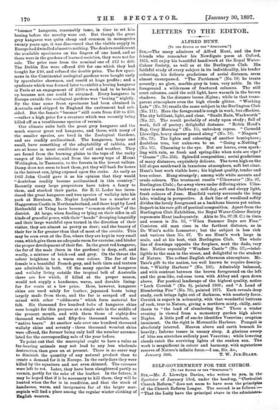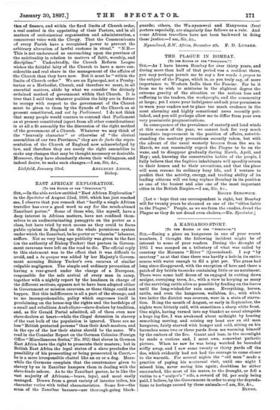SELF-GOVERNMENT FOR THE CHURCH.
[To THE EDITOR OP THE "SPECTATOR.") SIR,—Mr. J. Llewelyn Davies, who writes to you, in the Spectator of January 23rd, under the heading, "Clericalist Church Reform," does not seem to have seen the principles of the Church Reform League. The second is as follows That the Laity have the principal share in the administra-
tion of finance, and within the fixed limits of Church order, a real control in the appointing of their Pastors, and in all matters of ecclesiastical organisation and administration, a -concurrent voice with the Clergy. That the Communicants of every Parish have a recognised power to prevent the -arbitrary alteration of lawful customs in ritual." " N.B.— This is not understood as encroaching upon the province of -the spirituality in relation to matters of faith, worship, and discipline." Undoubtedly, the Church Reform League wishes the faithful laity of the Church to have a more con- siderable and real share in the management of the affairs of the Church than they have now. But it must be "within the limits of Church order." We are an Episcopal, not a Presby- terian or a Methodist, Church, and therefore we must, in all essential matters, abide by what we consider the divinely -ordained method of government within that Church. It is true that I said that whatever position the laity are in future to occupy with respect to the government of the Church -must be given to them by the Synods of the Church as at present constituted, and not by Parliament. I do not think that many people would venture to contend that Parliament as at present constituted (apart from all other considerations) is at all a fit assembly for the discussion of the right method of the government of a Church. Whatever we may think of the "heavenly character" or otherwise of "the clerical assemblies of our two Provinces," they are de facto the repre- sentation of the Church of England now acknowledged by law, and therefore they are surely the right assemblies to make any changes that may be thought necessary or desirable. Moreover, they have abundantly shown their willingness, and indeed desire, to make such changes.—I am, Sir, &c., Bishop.



















































 Previous page
Previous page